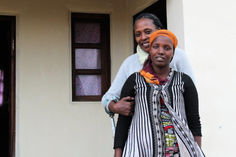PETER FRANTZ

When Neema, the firstborn child, contracted polio, it was considered as a disgrace for the family (Neema was actually the fourth child born, but the first that lived). In the highly Christianized area by colonizing Europe, Neema was considered cursed by God. Neema’s mom though didn’t look at Neema through that lens. She believed that every person born was born with the purpose of God on their life. Considering these things, and the fact that the only way for a woman to survive in the area is to be married (being that there is no inheritance for women and no other way to make a living in this region of subsistence farmers), Neema’s mom determined to make sure that Neema always had money for school; thinking that school was going to be Neema’s only possibility for making a way for herself.
As Neema grew to school age, with the next several children born being boys, Neema would often overhear extended family and other community members ridiculing and shaming her parents, and especially her mom, for wasting school fees on Neema, who would never amount to anything. They said that Neema should be shut away in a back room, out of site, and the school fees saved for her young brothers. Neema’s mom however wouldn’t wear that shame, and continued to provide school fees for Neema.
When Neema was in the 3rd grade, an uncle on Neema’s mom’s side came up the mountain for a visit and Neema’s mom asked him to take Neema, who was only able to pole-vault herself along on a stick in those days, down the mountain to a city where she wouldn’t have so far to go each day to attend school. There is a lot that happened in the interim that helped to shape Neema into the woman she is today, but what everyone knows is that Neema went on to be the first woman with disability from their tribe to graduate university, and eventually served as chief advisor to Congo’s Minister of Gender and Family.
In 2007, when Neema’s Minister lost her job due to the president’s cabinet reshuffle, Neema came back to South Kivu Province in east Congo, and began working to try and help women with disabilities. Neema then founded SAFECO in 2012, elevating her work to include all Congolese women, and opening the first Maman Shujaa (Hero Women) Center in the capital of the province, Bukavu. In 2014, Neema was able to build a Center in that remote area where she was born, the mountains of Itombwe, where everyone still lives in mud huts, that today is a 3,000 square foot modern facility that hosts a number of programs for women, girls, and their families. And Neema is working hard to get funding for a community water system that will provide clean water to over 2,000 surrounding residents.
Just a few months ago, Neema broke ground on a new all-girls school for the area. This action is what is really doing the talking these days. Neema was that little girl with disability, cursed by God, that no one thought could ever amount to anything. Their best advice was to shut her away so the family could hide their shame – the shame of Neema.
But here is that little girl, now a woman, who tells everyone that she was rescued from that life of ignorance and slavery to the cultural paradigm, because she got polio. She escaped being married off at the age of 14 or 15 years old and went on to be a university graduate, and advocate for women’s rights, speaking six languages and serving her nation at a very high level. Neema tells everyone that her life was made possible by education. Polio and the love and sacrifice of her mom, enabled her to escape the paradigm and grow in such capacity, that now she is the one able to lead her community into an entirely different future. Neema says, “this is what educating just one of our girls can do. Think of the possibilities if we educate all of our girls. Women are the fabric of family, of community, and given the capacity, can transform the future of an entire nation.”
The girls of Neema’s home village, and the girls who have joined themselves to the Maman Shujaa Center, get that. And in fact, their hope goes beyond themselves. Their hope extends into the lives of their communities and beyond. They also want to escape as Neema escaped, to find a life of possibility, of purpose and destiny.
Neema is simply the first, the poster child, of the impact educating a girl can have on her community. But the girls that graduate from this new school will become the reality of the future that Neema has been working so hard to create for her people.



















